Coronavirus outbreak at Melbourne psychiatric facility
Albert Road Clinic has been revealed as the Melbourne psychiatric centre at the centre of Victoria’s most active cluster of coronavirus, with 14 cases linked to the facility. It has prompted a warning against complacency as the state recorded six new cases overnight.
Coronavirus
Don't miss out on the headlines from Coronavirus. Followed categories will be added to My News.
This coronavirus article is unlocked and free to read in the interest of community health and safety. Get full digital access to trusted news from the Herald Sun and Leader for just $1 for the first 28 days.
A COVID-19 outbreak in a Melbourne psychiatric centre has left three patients in hospital and another 11 infected with the virus.
The privately run Albert Road Clinic has been placed in lockdown to prevent the outbreak spreading further.
Dozens of patients, staff and visitors who have entered the facility since March 24 are now considered close contacts and have also been placed in isolation as Victorian health authorities try to limit the cluster’s spread.
Albert Road Clinic chief executive officer Jane Pickworth confirmed the outbreak, saying the safety of patients, staff and doctors was of paramount importance.
She said the a clinic was working closely with the Department of Health and would implement all additional restrictions effective immediately.
In a statement, the Albert Road Clinic said the 14 cases included staff and recently discharged patients from the clinic, who have tested positive for COVID-19.
“The clinic is working closely with the Public Health Unit on contact tracing to ensure that any person who has been identified as a close contact of the confirmed cases, can be advised and isolated accordingly,” the clinic statement said.
“The clinic is also contacting all recently discharged patients.
“There is an immediate cessation of all new patient admissions to the clinic and the movement of staff and patients across the facility has been restricted.
“All staff and doctors will be tested and have been advised not to work in any other clinical setting.”
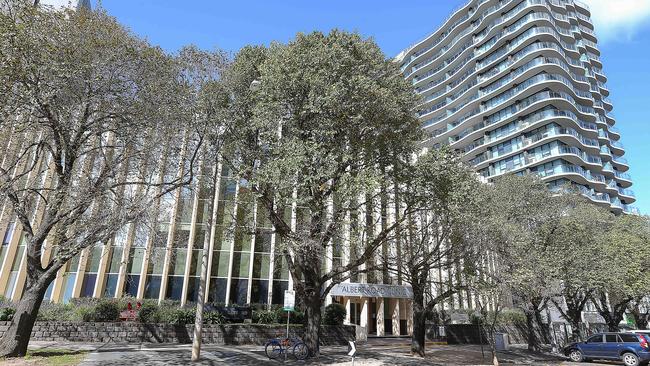
There were six COVID-19 cases confirmed in Victoria overnight, including three from the psychiatric centre.
With five patients, five staff members, and four household contacts now linked to the outbreak, Victoria’s chief health officer Brett Sutton said the psychiatric unit was the state’s most active cluster.
“There are three hospitalised cases, one of those is in intensive care,“ Prof Sutton said.
Although the first case emerging from the psychiatric unit was confirmed in late March, the number of coronavirus infections climbed steadily in recent days prompting health authorities to discuss the outbreak publicly this morning.
Although he would not release the name of the facility, Prof Sutton said the psychiatric centre was locked down.
He said no transfers were occurring in or out of the facility, staff were only working in single wards and were not permitted to work at other facilities.
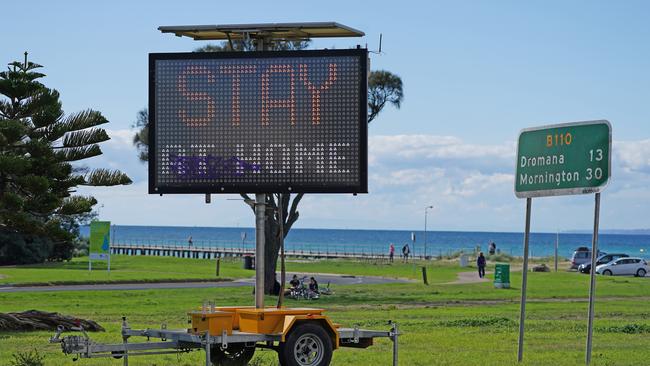
Anyone who has been in contact with the centre since March 24 are now considered close contacts, which has placed dozens of people in quarantine as health authorities race to test everybody connected.
“There is a really significant shutdown of activities in that facility,“ Prof Sutton said.
“We are doing very substantial things, but we understand the explosive potential in closed facilities as we have seen in hospitals, in aged care facilities and in other settings like that.”
Prof Sutton also maintained there was no immediate plan to reopen Victorian schools; however, he left the door open to reviewing learn from home directives in the coming weeks.
“I have always said I will review, on a day by day, week by week basis according to how the numbers are going in the state,” he said
“The state of emergency goes in in till May 11, but that is only a point of review — it does not mean there will be a change in what the advice is.
“My advice has never changed on schools — I have always said it should be a mixed learning, that kids should learn at home to the extent feasible and that we look into it over time.”
Authorities have also warned Victorians against complacency, saying there was still potential for a second wave outbreak.
“Potential for waves into the future will be there as long as people are not following the restrictions we have,” Prof Sutton said.
“Potential for late wave, second wave for some countries, will be there unless we do physical distancing into the future.”
Victoria Police yesterday issued 54 fines across the state for people found to be breaching COVID-19 social distancing measures.
Health minister Jenny Mikakos said officers had conducted 661 checks in the past 24 hours, meaning almost 28,500 checks have been undertaken since March 21.
PM RENEWS PRESSURE TO GET VIC KIDS BACK IN SCHOOL
Prime Minister Scott Morrison has renewed pressure on Victoria to get children back into the classroom “as quickly as possible”.
As the National Cabinet plans to ease some restrictions in three weeks, Mr Morrison said his first priority was “to get kids back to school, to get people back to work”.
Restrictions on community sport, smaller group gatherings, retail stores and funerals are also in line to be eased soon. Mr Morrison flagged the border could be opened to New Zealand well before other countries.
Mr Morrison’s strong stance on schools has been backed by Chief Medical Officer Brendan Murphy, who said his group of 30 advisers all believed schools were safe environments.
“We are hopeful that progressively there will be a reopening of schools,” Prof Murphy said.
About 97 per cent of Victorian students are learning remotely, after the state government told parents to keep children at home unless they could not learn there safely.
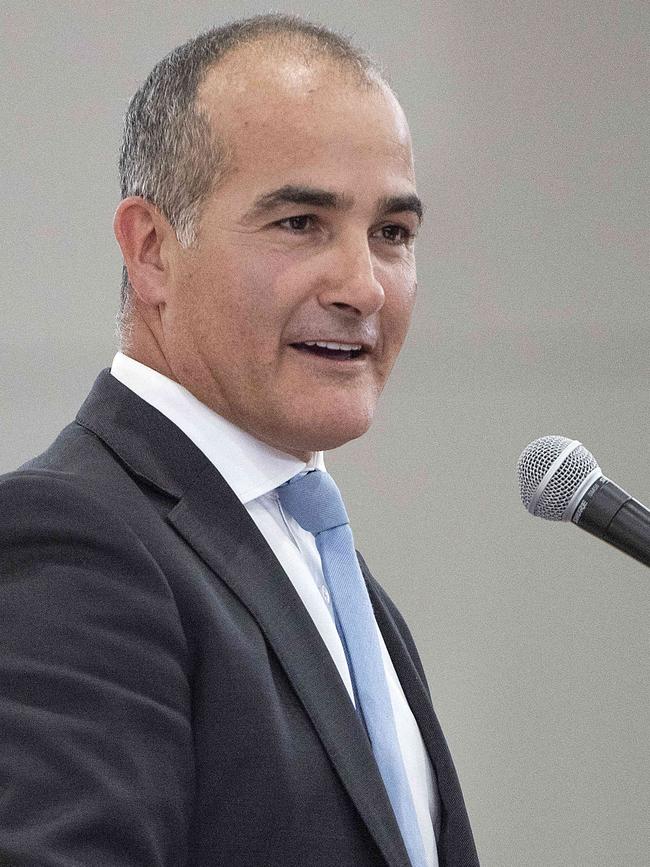
Victorian Education Minister James Merlino hit out at the “reckless” actions of Fitzroy Community School, which the Herald Sun revealed on Thursday was planning to bring back half its students next week, with strict measures in place based on Prof Murphy’s advice.
Mr Merlino said that was “a direct contradiction” of Victorian Chief Health Officer Brett Sutton’s edict to continue remote learning for all of term two.
Mr Morrison said he was “most keen” to see children back in school.
The National Cabinet was due to meet again on Friday and will receive the latest data on the reproduction rate of the coronavirus in Australia — a key measure which will guide the easing of restrictions.
Victoria recorded one new case on Thursday, taking the state total to 1337, but a man in his 60s died in hospital — the 16th Victorian victim of the virus.
Prof Murphy, appearing before a Senate inquiry into the nation’s coronavirus response on Thursday, said the national medical expert panel would not contemplate allowing large-scale gatherings again soon.
“Certainly some relaxation of the size of small groups is possible,” he said. “There are a range of measures that they’ve asked us to consider, things like community sport, some retail measures, all of those things will be in the mix.
“But we have to weigh up the public health risk versus the benefit to society and the economy.”
PARLIAMENT EXPECTED TO PASS $24.5B RELIEF PACKAGE
RUSH ORDER ON JOB CASH
The big banks will rush through loans urgently needed by businesses to pay their workers after the federal government raised concerns about reports of delays.
About 275,000 businesses — half of which are sole traders — have applied to access the government’s $130 billion JobKeeper scheme, with the $1500 fortnightly wage subsidies to flow from next month.
To be eligible, businesses have had to keep paying their workers since March 30, with the first taxpayer-funded subsidies to be backdated until then.
But Prime Minister Scott Morrison said on Thursday he was “concerned at the increasing number of stories” from businesses frustrated by delays accessing bridging finance from the banks to cover their costs until the JobKeeper money was made available.
“These banks know their customers. They work with these businesses, they are there to stand by these businesses in their time of greatest need and that is now,” he said.
Treasurer Josh Frydenberg and Australian Taxation Office commissioner Chris Jordan held talks with the big bank bosses on Thursday, who agreed to set up dedicated hotlines for businesses and to expedite the processing of their loan applications.
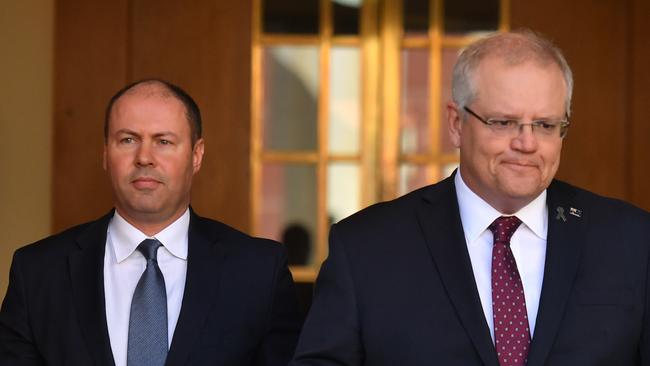
Almost 587,700 JobSeeker payment claims have been processed in the past six weeks — more than the government would usually handle in a year.
About 6.8 million people already on government support payments, including pensioners and carers, have received one-off $750 handouts.
It came as Radio Rentals announced on Thursday it would close 62 stores and make 300 staff redundant.
But in good news for Victorian jobs, the Portland aluminium smelter was spared from closure, despite joint owner Alcoa moving to shut other sites. The US-based company launched a review of its assets last September, warning loss-making aluminium smelters could be closed if it could not cut costs and carbon emissions.
Although the company has committed to remain open until mid next year, Alcoa executives have said the company will hasten the review as a consequence of the downturn. TheATO has approved 456,000 people struggling during the coronavirus crisis to withdraw an average of $8000, totalling $3.8 billion, from their superannuation nest eggs.
Mr Frydenberg said the government’s cashflow boost program for employers had already sent out another $3 billion to 177,000 businesses employing 2.1 million workers
TRANSMISSION RISKS TO DICTATE SOCIALISING RULES
Easing coronavirus restrictions could be a matter of trial and error over the coming months, with experts warning a full return to normal life is impossible without a vaccine.
As governments and health authorities plan to ease social and travel restrictions, epidemiologists warn a return to mass gatherings such as weddings, conferences, sporting events and even working in big, open-plan offices is not on the agenda.
Rather, extended family dinners and meetings with loved ones may be back on the menu in the first opening up of society in a move to lift spirits and overcome mental health issues.
Because Australia successfully introduced so many measures at the same time, University of Melbourne infectious diseases epidemiologist James McCaw said it was difficult to know which actions had made the biggest difference and therefore which could be wound back safely first.
Monitoring the spread of COVID-19 cases as measures were relaxed — such as encouraging public transport or allowing football matches and community-level sport to restart — would help show which ones carried the least risk.
Prof McCaw said it would be a balancing act that could see some social distancing measures relaxed and then reintroduced if the increase in COVID-19 cases was too severe.
“Depending upon the long-term strategy we might tolerate any small, very
slow-growing epidemic,” Prof McCaw said.
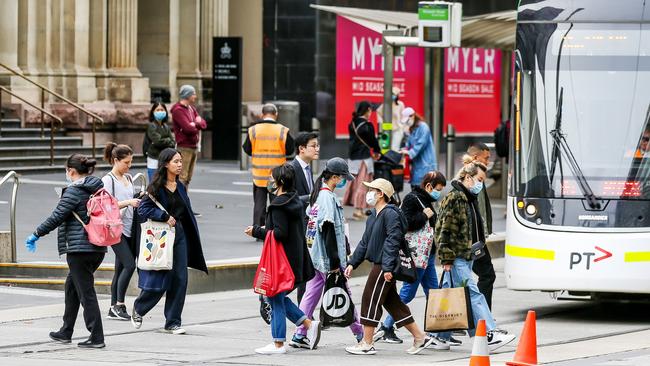
“The rational and logical policy approach here is to try one thing, monitor it very carefully, and see if we can tolerate it in an epidemic transmission sense.”
Regardless of how well coronavirus was subdued in Australia, University of Melbourne infectious disease epidemiologist Kathryn Snow said a return of weddings and big sporting crowds before a vaccine was developed would see Australia reach Italian levels of COVID-19.
Even with testing available for all, Dr Snow said asymptomatic cases or people who shunned tests presented too much danger to allow bigger crowds.
“It is not the case that all the restrictions that we have currently are going to be gradually relaxed over the next month,” Dr Snow said.
“There will always be some people who are not picked up by a surveillance system. So we still need enough measures in place that when cases do seep through that the consequences of that are not out-of-control transmission.”
The epidemiologists have also raised the prospect of different restrictions between states, or even areas within territories, to address individual outbreaks.
With regional towns less able to respond to an outbreak, Dr Snow warned activities such as camping or travelling too widely could present problems.
The increasing impact of social distancing measures on mental health, suicide rates, chronic disease, family violence and child abuse was also being balanced with the risks of the virus.
However, Prof McCaw warned it was unrealistic to expect a return to normal life anytime soon.
“The reason the case numbers are down low is because of the control measures, it is not because the virus has run its course.
“The absolute vast majority of Australians, I suspect it is more than
99 per cent of us, are still susceptible to this infection.
GOWNS A GROWTH MARKET
A family-owned manufacturing business has overhauled its production lines to produce thousands of surgical gowns for frontline health workers during the coronavirus crisis.
Clets Linen, based in Heidelberg West, is switching from making garments for hospitality to medical-grade gowns, and will produce 3750 for the national medical stockpile in its first run.
Federal industry minister Karen Andrews said it highlighted how Australian manufacturers could shore up supplies instead of relying on other countries.
“We’re not only interested in securing these gowns for the national medical stockpile right now but we’re talking with Clets about how we could help them scale up their operations into the future so they have the supplies that state and territories need for their health systems,” Ms Andrews said.
Clets managing director Lisa Pachos said, “It will be good to get manufacturing back into Australia to get us to stand on our own two feet.
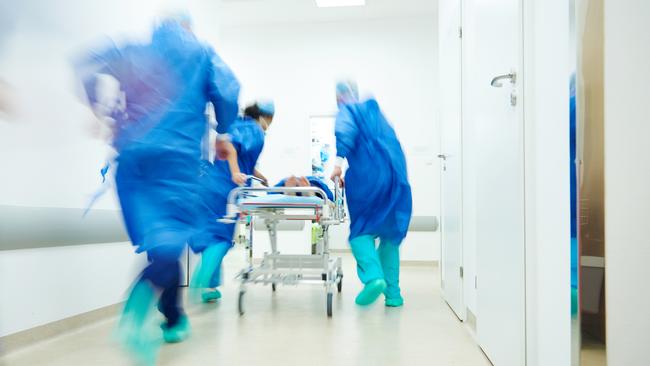
UNIONS IN KEY ROLE TO REBUILD
Prime Minister Scott Morrison says relationships forged with the union movement and the states and territories during the coronavirus crisis will be essential to transforming the nation’s economy.
Detailed reform plans left to gather dust in recent years will be looked at “with very fresh eyes”, Mr Morrison said on Thursday, as part of his focus on the post-pandemic rebuild.
He said he was “forever optimistic” the spirit of co-operation seen during the crisis would last, as Australia faced having to recover from an economic contraction tipped to rival the Great Depression.
“The level of co-operation that is occurring between the COVID Commission, industry, business, unions, others … it is positive in the sense that it is drawing so many different views and feedbacks far more quickly than it normally does and I welcome that,” Mr Morrison said.
He said the government would not raise taxes or adjust perks, such as franking credits and negative gearing, if the changes did not grow the economy. On extending Budget deficits, he said he would be guided by expert advice to “save lives, save livelihoods, see Australia stronger again”.
MORE NEWS
COVID-19 INCREASE DROPS AS NATION CONSIDERS EASING BANS
THE AUSSIE RESTRICTIONS THAT COULD BE LIFTED FIRST
